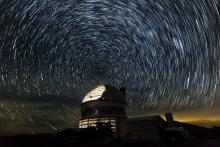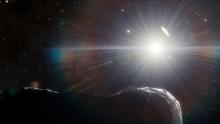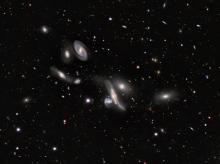Listen to today's episode of StarDate on the web the same day it airs in high-quality streaming audio without any extra ads or announcements. Choose a $8 one-month pass, or listen every day for a year for just $30.
You are here
Euclid
Most of what makes up the universe is dark -- dark matter and dark energy. No one knows what they are, which is why they’re described as “dark.” But we observe their effects on the stuff we can see. That shows that they account for more than 95 percent of all the matter and energy in the universe. Everything that makes up stars, planets, and people is just crumbs.
Scientists have been working for decades to determine just what dark matter and dark energy really are. And they’re set to get a good new tool to help with that quest as early as this month -- a European space telescope that will look into the early universe.
Euclid will study the shapes and motions of galaxies out to distances of about 10 billion light-years. That means it will see the galaxies as they looked when the universe was less than a third of its current age.
The craft will use gravitational lensing to study the shapes of galaxies. The gravity of galaxy clusters distorts the view of the galaxies that appear behind them. The way those distant galaxies are distorted reveals how much dark matter is contained in the intervening clusters.
The telescope also will measure how fast the galaxies are moving away from us -- a result of the universe’s expansion. That will tell us when dark energy began to dominate the universe, causing it to expand faster.
Euclid should study 10 billion objects across a third of the sky -- shedding some light on the dark universe.
Script by Damond Benningfield





